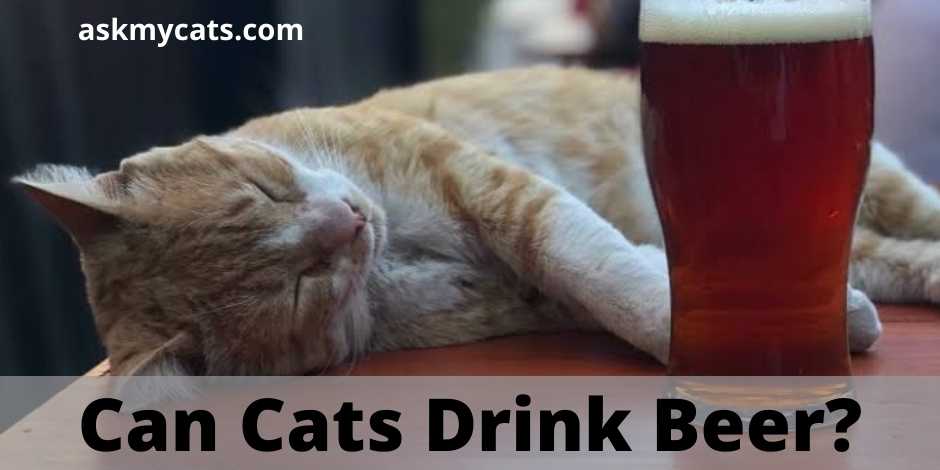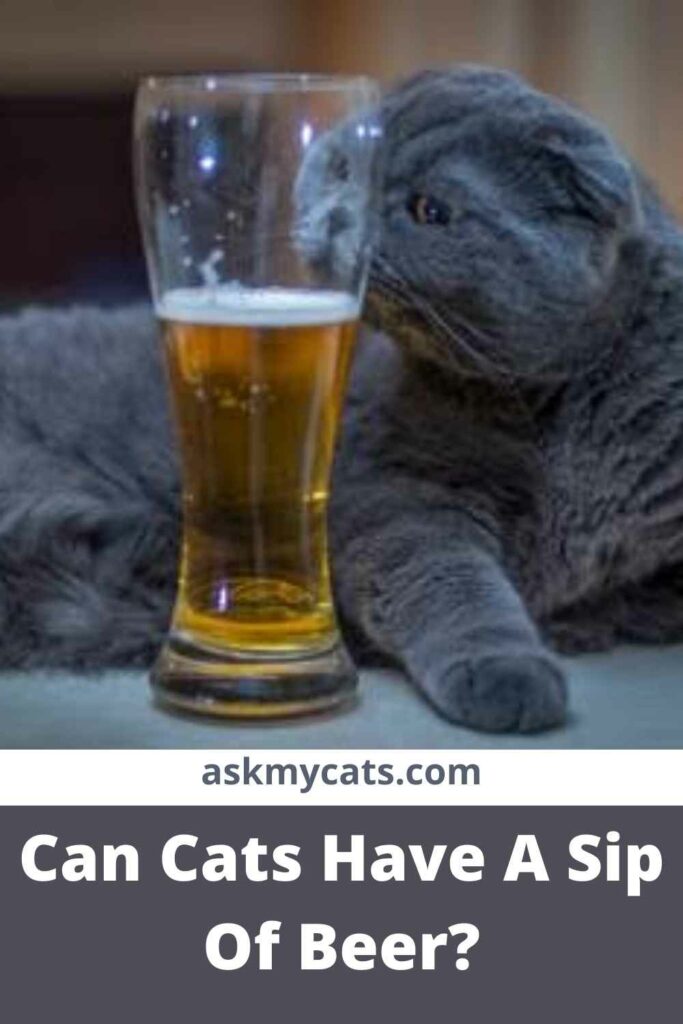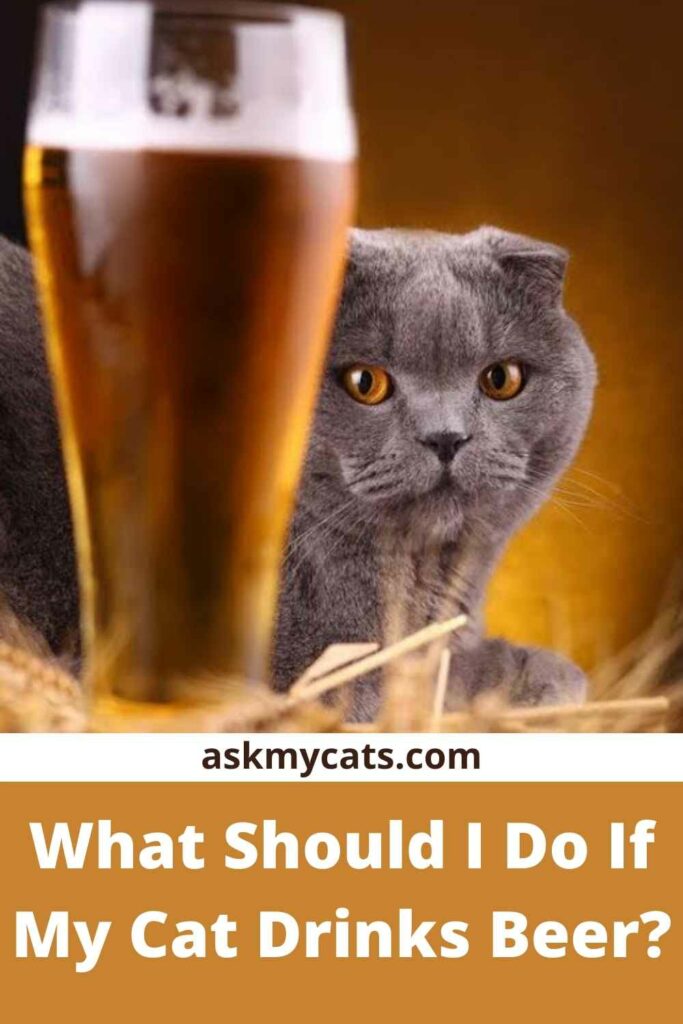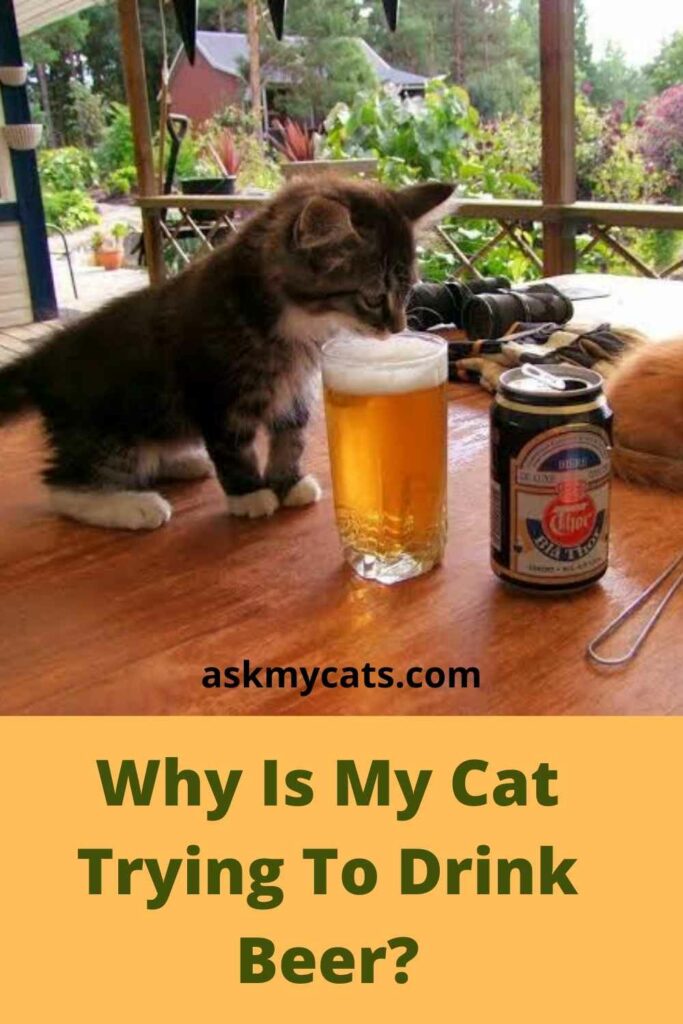It’s difficult to plan for every pet-proofing circumstance, whether you’re having a few friends around for dinner or hosting a huge family get-together.
So, what should you do if you discover your cat sipping beer from a cup placed within her reach or taking the last taste of a cocktail?
To answer your question, no, cats cannot drink beer. This is due to the presence of alcohol, which is hazardous to your cat’s health.
If you suspect your pet has consumed a considerable amount of beer or is exhibiting symptoms concerning clinical symptoms, seek urgent veterinarian attention.
Keep reading as in this article we will tell you everything you need to know about beer and cats.
However, if you want to learn more about the effects of alcohol on your cat, check out our other two articles: ‘Can Cats Get Drunk?’ and ‘Can Cats Drink Wine?’.


Give Your Cat the Perfect Day
Get the Free Ebook!
Is Beer Dangerous For Cats?
Yes, beer is dangerous to cats. This is due to the presence of alcohol. Except that, most of the chemicals in beer are quite harmless to cats.
Alcohol is very poisonous to cats and can result in alcohol poisoning, which can be deadly. It’s also powerful, since a few teaspoons of alcohol may kill certain animals.
Of course, not all beers contain the same quantity of alcohol, thus the severity of the problem will vary depending on the strength of the beer.
Beer that is light in colour is typically less hazardous than beer that is deeper in colour. Also, the amount drunk is essential, but most cats won’t drink too much in the first place.
Cats can be poisoned by hops, although this is typically only a concern if you make your own beverages.
This can lead to a disease known as malignant hyperthermia. An unusually high body temperature and muscular spasms define this condition. This can lead to death.
What Happens If My Cat Drinks Beer?
Because beer is relatively low in alcohol, a few sips from your glass shouldn’t cause too much harm to your cat.
If you find your cat drinking some of your beer, simply keep an eye on them for a few minutes to make sure they’re okay.
You should be on the alert for the following symptoms in particular:
- Lethargy
- Coordination issues
- Excessive drooling
- Vomiting
- Weakness
- Reduced respiration rate
- Blood sugar levels that is low
- Low body temperature
Seizures and respiratory failure may also be present in your cat. Because the illness can be quite advanced in a small amount of time, you should seek emergency medical attention right away.
Can Cats Have A Sip Of Beer?

No, cats should not have a sip of beer. Cats, dogs, and other household pets should never be given alcohol. There are serious consequences to giving your cat beer.
While your cat may love drinking the beer and find it funny at first, the danger of alcohol poisoning will quickly put an end to any amusement.
Alcoholic drinks, as well as alcohol-containing meals, may have extremely harmful effects on a cat’s health, and can even be deadly.
Here are some of the serious health issues that your cat could face if he or she is permitted to drink beer:
- Vomiting
- Diarrhea
- Failure of the liver
- Breathing problems
- Seizures and tremors
A cat owner will never let their cat drink beer, or any other sort of alcoholic beverage.
If your cat drinks beer before you can stop it, such as from a glass on the table, you must keep a tight eye on it over the following several hours. If your cat begins to lose coordination, falls, or loses her balance, you should take her to the veterinarian right away.
Your veterinarian’s treatment options will vary based on the severity of the cat’s intoxication, as well as the cat’s age and any other underlying health issues.
The dangers of letting your cat to drink beer are simply too great to risk even one inquisitive taste.
Do Cats Like The Smell Of Beer?
The smell of beer usually does not entice pets. However, if ingested in large amounts, it can be toxic for your furry friend.
Therefore, keep your cat away from alcohol and make sure that she does not drink any.
Do Cats Love Beer?
To be honest, cats are just inquisitive. They come to check anything that sounds like a bag or a bottle opening in the hopes of receiving a treat.
If you’re opening a can of beer, it could sound like you’re opening a can of food to them. That’s why she rushes up to you.
If you always offer canned food to your cat, she will be familiar with that sound. They believe the sound of a beer bottle or can being opened is similar to that of a can of cat food being opened.
What Should I Do If My Cat Drinks Beer?

As previously said, the first step is to figure out what they drank and how much they drank. If it’s only a smidgeon of light beer, your cat should be okay. Just keep an eye on your cat for a while.
If you cat drinks anything more or anything stronger, you should start to be concerned.
Look for signs that your cat is inebriated, but if you know your cat has consumed a significant amount of alcohol, it’s generally best to take preventive measures rather than waiting to see how your cat reacts.
Poison control is an excellent place to start, and you should search for local emergency vets in case you need to hurry your cat to the clinic.
Try to persuade your cat to drink water while you wait for further information. This can help prevent dehydration and reduce harm, but it can be difficult to persuade an uncooperative cat to drink.
You should also gather everything you’ll need to transport your cat to the vet, such as a carrier, leash, and anything else you think you’ll need.
If your veterinarian advises you to bring your cat in, don’t delay. The longer your cat goes without treatment, the worse their chances get.
When you go to the clinic, make sure to tell them all you know about what they drank, how much they drank, and when they drank it.
Your veterinarian will most likely order blood tests to determine your cat’s vital signs, and they may recommend artificial ventilation, IV fluids, or specialist medicine to reduce the amount of alcohol in your cat’s bloodstream.
Why Is My Cat Trying To Drink Beer?

Cats are prone to licking and eating things they shouldn’t. Some cats are known to consume wool, while others enjoy licking trash bags. If given the chance, cats will devour anything.
Most cats aren’t particularly clever, and will eat (or at least try to eat) anything that appeals to them. They’re thought to be picky eaters, but only when it comes to foods that people want them to consume.
They will consume toilet paper and cardboard cartons and drink antifreeze if left to their own ways.
Cats, on the other hand, like protein and fats. It’s most likely the malty taste in beer that attracts it, not the sugar.
Malt extract is included in a variety of supplements for pets that aren’t eating enough. So it appears that the flavor appeals to enough cats in some manner for it to be extensively utilised.
Malt extract is a popular ingredient in home brewing. It’s made by roasting sprouted grains, generally barley, stewing them in boiling water, extracting the grains, and concentrating the “barley water” and all of its sugars into a paste.
Your cat likes the taste of malt extract. Maybe that is why she is trying to drink beer.
How Can I Prevent My Cat From Drinking Beer?
Because most cats are uninterested, you won’t have to go to great lengths to conceal your booze. Still, the most critical measure you can take to avoid an accident is to keep any alcohol out of reach from your cat.
Many cats, as you’re probably aware, enjoy knocking items off countertops, and the more breakable the object, the more cats enjoy swat at it. Don’t keep beer bottles out on countertops or table-tops since they might be quite tempting.
Also, keep an eye on where you place open containers. If you’re not cautious, your cat could simply drop by and take a sip from your glass, and the temptation to push it on the floor may be too much for them to bear.
If you’re really concerned about keeping your cat safe, the best approach to do so is to avoid bringing alcohol into the house in the first place.
However, because alcohol may hide in unexpected locations, such as culinary materials, remaining sober may not be enough to prevent your cat from ingesting alcohol.
Frequently Asked Questions
Are Cats Attracted To Alcohol?
While most pets aren’t fond of alcohol, rich delicacies such as cream liqueurs and eggnog may pique their attention. Because your cats may become inebriated without your knowledge, it’s important to be aware of the hazards of alcohol poisoning.
What Happens If A Cat Ingests Hand Sanitizer?
Hand sanitizer ingestion in high doses can cause ethanol intoxication in and cats, resulting in symptoms such as altered behaviour, reduced coordination, depression, low blood sugar stomach discomfort, and even trouble breathing.
What Happens If Cats Drink Alcohol?
Alcohol is extremely harmful to cats and dogs. Animals suffering from alcohol poisoning may experience diarrhea, vomiting, depression, lack of coordination, difficulty breathing or even death.
Final Words
Beer should never be given to cats since the alcohol in it can create significant problems for them, including death. As a result, whenever you have beer in the house, you need be extra cautious.
Even though beer is one of the less harmful alcoholic beverages, you should keep it away from your cats. While it may be wonderful for you, it is not worth it if it results in the death of your pet.
We recommend that you go through our other articles on cats and their relationship with alcohol to gain a better understanding of the weird interests of your feline.
Drop down your questions regarding your furry friend in the comment section below. We will answer them soon.
